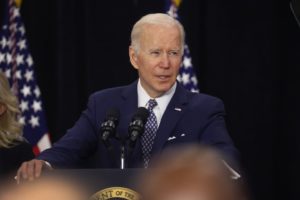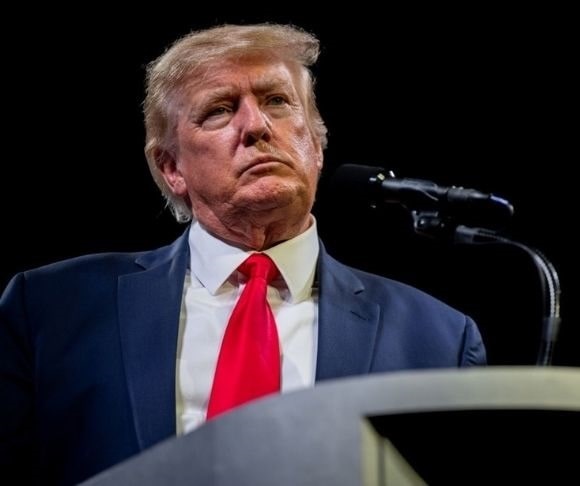Much ink has understandably been spilled in recent weeks about the influence of Donald Trump on congressional and gubernatorial races across the land. But the continuing dominance of the 45th president over the Republican Party is only half the story of the upcoming elections. The other half is the distance Democrats are keeping from the 46th president.
Trump has played to type by offering up a heaping helping of the most treasured commodity in the GOP these days: his endorsement. He has publicly – and often loudly – backed candidates in almost every GOP congressional and gubernatorial primary, whether the race was competitive or not. And the weight of his influence can be clearly seen in Exhibits A and B, the triumph of upstart JD Vance in the Ohio Senate primary, and the surge of Dr. Mehmet Oz in Pennsylvania, whose endorsement by Trump turned a mildly competitive race upside down and launched Oz within sight of victory.
[substack align=”right”]Meanwhile, for Joe Biden, crickets.
Indeed, while Trump has, at last count, endorsed ten candidates for governor, 31 for the House, and eight for Senate – plus a slew at the state and local level – Biden has issued a grand total of two – count ‘em, two – endorsements. And one of them, for incumbent congressman Kurt Schrader in Oregon, may already be backfiring, with local party officials publicly criticizing the endorsement and the progressive challenger now gaining strength ahead of next Tuesday’s primary.
Indeed, it is the rare Democrat who has sought and received the endorsement of this sad sack president. Most don’t want to be seen anywhere near him, and thus be attached to his failed administration. Many of those candidates are undoubtedly muttering under their breath about how much Biden’s basement-level approval is weighing down their campaign – and how badly they are likely to get wiped out in November. Even Jeff Bezos is all over his case, for heaven’s sake.
Apparently, we have come a long way since January 6, 2021, when the notion that Trump would continue to exert his present level of influence over national politics seemed remote to many observers. Biden had a huge opening that would allow him to sweep into the White House, stabilize the body politic and brush away the remnants of the Trump era amidst a renewed sense of hope and unity in a pandemic-weary country begging for both.
Instead, after 16 months of proving he is plainly out of his depth – to a level few could have imagined given his near 50 years in the Swamp – Biden is on the ropes and getting pounded day after day, while Republicans are begging for a Trump return – even the wildly popular Ron DeSantis finishes a distant second to the former president in recent polling among the GOP faithful. Meanwhile, Democrats are left with the shell of a man plainly in decline who has left a Pigpen-style trail of dust and dirt in his wake, and whose chickens are coming home to roost for all the world to see.

Joe Biden (Photo by Scott Olson/Getty Images)
The voters have delivered their post-election verdict on Joe Biden, one that is increasingly locked in place and unlikely to change significantly before November, if at all, considering how abidingly unpopular almost all of his policies have proven to be – he was as low as 39% approval in recent polls by Monmouth and IBD/TIPP – and the GOP almost three points ahead in the generic ballot, according to the Real Clear Politics average.
People intensely dislike the things now attached to this president: inflation, soaring food and energy prices, critical shortages of baby formula, the continuing crime wave in urban America, his border policies (which are about to get even worse), his surrender in Afghanistan, his now-paused malodorous Disinformation Board – the list goes on. A yawning chasm has developed between Biden and the independent voters who put him over the top. Some will point to Trump’s own low approval at a similar stage of his presidency, but that was in the midst of a defining media-generated scandal that proved to be fraudulent, Trump-Russia collusion, and the scandalous distortion of his remarks about Charlottesville. Biden, on the other hand, was all but placed in the White House by a single-minded anti-Trump Fourth Estate that now faces the daunting, daily task of how to report on the flailing presidency of their man.
For Trump, this election season has been the opposite. If anything, his influence has actually been understated. Sure, some will say his revenge endorsement of David Perdue against incumbent Governor Brian Kemp in Georgia is ill-advised – Kemp is leading by more than 20 points in the latest polling. Others will point to the loss of the Trump-endorsed gubernatorial candidate in Nebraska recently, or how many of the endorsements Trump has issued are in non-competitive races. But that misses the point. Fact is, even when Trump endorsed a specific candidate, the competitors in those races continued to espouse Trumpism.
 In almost every instance, most visibly in the much-publicized races in Ohio and Pennsylvania, the candidates denied Trump’s endorsement still vigorously espoused – explicitly or implicitly – the America First agenda. Almost all the candidates claimed to be the most qualified to inherit the Trump mantle, and nary a word was spoken in favor of a return to the globalism of the Bush era. The remaining sliver of support for neoconservatism is now fronted by Liz Cheney, once a lock for re-election in her Wyoming congressional seat but now fighting for her political life after assailing Trump in the wake of January 6.
In almost every instance, most visibly in the much-publicized races in Ohio and Pennsylvania, the candidates denied Trump’s endorsement still vigorously espoused – explicitly or implicitly – the America First agenda. Almost all the candidates claimed to be the most qualified to inherit the Trump mantle, and nary a word was spoken in favor of a return to the globalism of the Bush era. The remaining sliver of support for neoconservatism is now fronted by Liz Cheney, once a lock for re-election in her Wyoming congressional seat but now fighting for her political life after assailing Trump in the wake of January 6.
The election of 2020 is now looking more and more like so many others from years gone by, with voters reacting to a decidedly negative turn of events by lurching far in the opposite direction. For example, after the radicalism of the 1960’s, voters picked hard-liner Richard Nixon. After Nixon’s scandalous resignation, they went for choir boy Jimmy Carter. After four years of Carter’s weakness, they elected strongman Ronald Reagan. This pattern has long been in place – leading to the conclusion that two years ago, Americans replaced a pandemic-plagued president many saw as too strong with one who has proven too weak. Now, the gigantic shadow cast by the 45th president, his record, and his agenda are threatening to make his successor, stripped of his congressional majorities, look not just weak, but helpless, come November.




